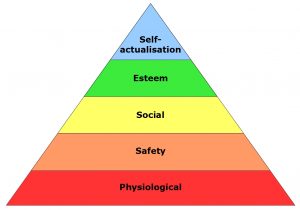Two Hierarchies Every Business Owner Should Understand
 An Enlightening Experience About Hierarchies
An Enlightening Experience About Hierarchies
I received an e-mail the day after a recent seminar from one of the attendees. Martin owns a small family-run business here in the Phoenix area. During the talk, I introduced what I call “Mitch’s Hierarchy of Customer Loyalty Needs”. It is my take on Maslow’s Hierarchy of Human Needs with regards to driving true customer loyalty for your business. Both are built on the concept that for people to move up the scale of needs (presented as triangles), they must fulfill the lower level needs first or they will never reach the next level of needs, let alone the top need.
At the bottom of Maslow’s hierarchy is physiological needs, things like food, water, warmth and rest. Next up the scale is safety, then belongingness and love needs, esteem (prestige and feeling of accomplishment) and self-actualization (achieving full potential) at the top.
For loyalty, I define: trust as the base of the triangle, followed next by basics like honesty, following laws and regulations, etc. Next comes internal quality of relationships, personnel and processes. Then comes the icing on the customer loyalty cupcake, your product. But at the tip of the loyalty hierarchy is the real cherry on top of the cupcake. I contend that it is the cherry that drives true customer loyalty.
You can read the definition of the cherry in my blogs on the topic or you can come find out what it is at one of my seminars. (Here is a link to one such post: http://excelgroupsolutions.com/customer-loyalty-found-what-next-part-iv/) The purpose of this blog is the insight Martin gave me when we quoted Steve Jobs in his e-mail: “Stay hungry, stay foolish”. Martin had heard Steve Job’s speech in which he explained what he meant, but Martin thought perhaps Maslow had an impact on Jobs’ thinking, too.
Steve Jobs and Abraham Maslow
It appears that Jobs is saying the opposite of Maslow…don’t move up the hierarchy if you want true success in life and business. Stay focused and persistent while being willing to take risk at the same time. So, is Jobs really anti-Maslow in his thinking? Martin and I think just the opposite, as for one to be able to logically realize they need to stay hungry and foolish one must first have satisfied their belongingness and love needs. Furthermore, for one to be able to take risks and truly be focused, they probably have achieved esteem and are well on their way to achieving self-actualization.
So, no! Jobs probably understood Maslow well in order to get to his pinnacle position in the world of business. Stay hungry, stay foolish, but plan for loyalty and long-term success! I like to say satisfied customers generate revenue, loyal customers generate profit. Ask yourself, where do you fall on the customer loyalty hierarchy? Do you have any missing links that will keep your customers from becoming truly loyal?
You have two challenges this month. One is to determine what customer loyalty holes you have in your business. You’ll have to fully understand the make-up of the hierarchy…and your company…before you can really answer that question. However, much more importantly your second challenge is to determine where you are on Maslow’s hierarchy. Do you have the drive and support Steve Jobs had when he was starting out? Does the team you have built? Do you have any holes in your business that are driving holes in your customer loyalty system? Are you prepared to “Stay hungry, stay foolish”?
If you have holes, fixing them must be your priority. Not doing so is why 80%+ of small businesses fail. Be the 20%!
